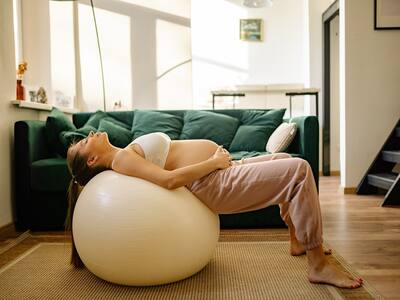
The declining number of eggs and reduced quality are two important reasons why conception after 35 poses clinical challenges for both the mother and the child.
There could be many reasons why a woman might choose to opt for pregnancy in her 30s or 40s. Once upon a time, it used to be not that usual for a woman to conceive after the age of 35 but these days, many women might choose today to experience motherhood in that age bracket. While many women might want to have other experiences in life before going for motherhood, others might have personal challenges like sickness or relationship problems or greater responsibility in their respective careers. However, biologically the fertility window for a woman is not that wide.
There is more to consider about pregnancy past your mid-30s. The more you age, the risk of a miscarriage or stillbirth increases. As per experts, the risk significantly goes up after 35. The declining number of eggs and reduced quality are two important reasons why conception after 35 poses clinical challenges for both the mother and the child.
Conception after 35
Women are born with a fixed number of eggs. A baby with ovaries has around 6 million eggs. When it is born, it is left with 1 or 2 million eggs. Around 100,000 eggs die each month till a girl reaches puberty. As a girl starts with menstruation, she ovulates one egg every month and the group of eggs that surround the mature egg die or degenerate.
As per the American College of Obstetricians and Gynaecologists (ACOG), a woman’s eggs start to decline rapidly after her mid-30s. Research has shown that a woman over 40 years of age has less than a 5 per cent chance of getting pregnant per menstrual cycle.
READ RELATED: Here’s How Vitiligo Can Affect Your Mental Health, From People Who Get It
As per reports, as the egg quality decreases, the genetic material also becomes more damaged and less reparable. Hence, the likelihood of genetic abnormalities also increases with age. Reportedly, the rate of having a baby with Down Syndrome increases rapidly with maternal age.
Minimizing risks with early care
As per quoted experts, high maternal age is associated with a higher risk of developing health conditions like gestational diabetes, pre-eclampsia, premature birth, higher chances of cesarean birth, and deep vein thrombosis (blood clot formation in women). However, as per experts, getting early and regular prenatal care can increase the chance of having a healthy baby after 35.
Total Wellness is now just a click away.
Follow us on
window.addEventListener(‘load’, (event) => {
// $(document).ready(function(){
$(‘#commentbtn’).on(“click”,function(){
(function(d, s, id) { var js, fjs = d.getElementsByTagName(s)[0]; if (d.getElementById(id)) return; js = d.createElement(s); js.id = id; js.src = “//connect.facebook.net/en_US/sdk.js#xfbml=1&version=v2.3”; fjs.parentNode.insertBefore(js, fjs);}(document, ‘script’, ‘facebook-jssdk’));
$(“.cmntbox”).toggle();
});
// });
});








